Short Business Proposal Letter
[Your Name]
[Your Title]
[Your Company Name]
[Address]
[City, State, ZIP]
[Email Address]
[Phone Number]
[Date]
[Recipient's Name]
[Recipient's Title]
[Recipient's Company Name]
[Address]
[City, State, ZIP]
Dear [Recipient's Name],
I am writing to propose a mutually beneficial business collaboration between [Your Company Name] and [Recipient's Company Name]. Our two organizations share a common vision for [specific shared goal or objective], and I believe that by joining forces, we can achieve remarkable success in this endeavor.
At [Your Company Name], we specialize in [brief description of your company's expertise and offerings]. We have a proven track record of delivering high-quality [products/services] that [highlight a key benefit or value]. We have closely studied [Recipient's Company Name] and are impressed by your [mention a relevant accomplishment or area of expertise], which aligns seamlessly with our aspirations.
Through this proposed partnership, we aim to leverage our collective strengths to:
1. [Specify the first key benefit or objective of the partnership]
2. [Specify the second key benefit or objective of the partnership]
3. [Specify the third key benefit or objective of the partnership]
We envision a collaborative effort that maximizes synergies and drives growth for both our companies. Our proposed collaboration structure includes [briefly outline the key elements of the collaboration, such as resource sharing, joint marketing efforts, co-development, etc.].
I would appreciate the opportunity to further discuss the details of this proposal with you. Please let me know a convenient time for a meeting or call. I believe that by combining our expertise, resources, and passion, we can create a dynamic partnership that sets new industry benchmarks.
Thank you for considering this proposal. I eagerly await your response.
Sincerely,
[Your Name]
[Your Title]
[Your Company Name]
[Email Address]
[Phone Number]
[Enclosure: Attach any relevant documents or materials, if applicable]
Partnership Proposal Letter
Subject: Strategic Partnership Opportunity
Dear [Recipient Name],
I am writing to propose a mutually beneficial partnership between [Your Company] and [Their Company]. After researching your organization's achievements in [specific field], I believe our companies share complementary strengths that could create significant value for both parties.
Our proposal centers on [specific partnership idea], which would leverage your expertise in [their strength] with our proven capabilities in [your strength]. This collaboration could potentially increase market reach by [percentage/metric] and reduce operational costs through shared resources.
I have attached a preliminary partnership framework outlining profit-sharing arrangements, responsibilities, and projected outcomes. The initial investment required would be minimal, with potential returns visible within [timeframe].
I would welcome the opportunity to discuss this proposal in detail at your convenience. Please let me know when we might schedule a meeting to explore this exciting opportunity further.
Best regards,
[Your Name]
[Your Title]
[Contact Information]
Service Proposal Email
Subject: Quick Solution for Your [Specific Need]
Hi [Name],
Hope you're doing well! I noticed you mentioned struggling with [specific challenge] during our last conversation. This got me thinking – our team has been helping companies like yours solve exactly this problem.
Here's what we could do for you:
- [Service 1] to address [specific pain point]
- [Service 2] for improved [benefit]
- [Service 3] resulting in [measurable outcome]
The whole process takes about [timeframe] and typically saves our clients [amount/percentage] in [area]. We've done similar work for [similar company type] with great results.
Want to hop on a quick 15-minute call this week to chat about it? No pressure – just thought it might be helpful.
Cheers,
[Your Name]
Product Proposal Letter
Subject: Innovative [Product Category] Solution for [Company Name]
Dear [Decision Maker],
I am pleased to introduce [Product Name], a cutting-edge solution designed specifically for organizations facing [industry challenge]. Your company's reputation for innovation and excellence makes you an ideal candidate for our newest offering.
Our product addresses three critical areas:
1. [Problem 1] – Our solution provides [specific benefit]
2. [Problem 2] – We deliver [quantifiable improvement]
3. [Problem 3] – Users experience [measurable outcome]
Implementation requires minimal disruption to existing operations, with full deployment possible within [timeframe]. The return on investment typically manifests within [period] through [specific improvements].
Enclosed you will find detailed specifications, case studies from similar implementations, and a customized pricing proposal based on your company size and requirements.
I would be honored to present this solution to your team and answer any questions you may have. Could we arrange a demonstration at your offices next week?
Sincerely,
[Your Full Name]
[Your Position]
[Company Name]
Investment Proposal Message
Subject: Time-Sensitive Investment Opportunity – [Project Name]
Dear [Investor Name],
I am reaching out regarding an exceptional investment opportunity that aligns perfectly with your portfolio's focus on [relevant sector]. This proposal requires immediate attention due to market timing constraints.
[Project/Company Name] presents a unique opportunity to enter the rapidly growing [market segment] with a proven business model and experienced management team. Key highlights include:
Financial Projections:
- Year 1: [Revenue projection]
- Year 3: [Growth projection]
- Break-even: [Timeframe]
- Expected ROI: [Percentage] over [period]
The total funding requirement is [amount], which will be allocated toward [primary uses of funds]. We are seeking [number] strategic investors who can contribute not only capital but also industry expertise and network access.
Market analysis indicates this sector will grow by [percentage] annually over the next [timeframe], positioning early investors for substantial returns. Our competitive advantages include [key differentiators].
I have prepared a comprehensive business plan and financial model for your review. Given the time-sensitive nature of this opportunity, I would appreciate the chance to present our proposal within the next two weeks.
Please let me know your availability for a confidential discussion.
Best regards,
[Your Name]
[Your Credentials]
Vendor Proposal Email
Subject: Cost-Effective [Service Type] Services
Hello [Procurement Manager],
I understand your company regularly requires [specific services] and thought you might be interested in exploring a more cost-effective alternative to your current arrangement.
Our company specializes in providing [service type] with a focus on quality, reliability, and competitive pricing. Here's what sets us apart:
- [Unique selling point 1]
- [Unique selling point 2]
- [Unique selling point 3]
We typically reduce client costs by [percentage] while improving [quality metric]. Our standard turnaround time is [timeframe] with rush options available.
I'd like to send you a customized quote based on your typical volume and requirements. Could you share your current needs or upcoming projects that might benefit from our services?
Looking forward to potentially working together.
Best,
[Your Name]
[Company]
[Direct Contact]
Consulting Proposal Letter
Subject: Strategic Consulting Proposal – [Area of Expertise]
Dear [Client Name],
Thank you for expressing interest in our consulting services during our recent conversation. I am writing to formalize our proposal for addressing the challenges you outlined regarding [specific business area].
Based on our discussion, I understand your primary concerns are:
- [Challenge 1] impacting [business area]
- [Challenge 2] resulting in [specific problem]
- [Challenge 3] affecting [operational aspect]
Our proposed approach involves a three-phase engagement:
Phase 1: Analysis and Assessment ([duration])
- Comprehensive review of current [systems/processes]
- Stakeholder interviews and data collection
- Identification of improvement opportunities
Phase 2: Strategy Development ([duration])
- Custom solution design
- Implementation roadmap creation
- Risk assessment and mitigation planning
Phase 3: Implementation Support ([duration])
- Change management assistance
- Performance monitoring setup
- Team training and knowledge transfer
Total project investment: [amount]
Expected completion: [timeframe]
Projected benefits: [specific outcomes]
Our team brings [relevant experience] and has successfully completed similar engagements for [industry] companies, achieving an average improvement of [metric].
I would welcome the opportunity to discuss this proposal in greater detail and address any questions you may have.
Professional regards,
[Your Name]
[Your Title]
[Consulting Firm]
Joint Venture Proposal Email
Subject: Exciting Joint Venture Idea
Hi [Name],
I've been thinking about our conversation last month about expanding into [market/region], and I have an idea that could be perfect for both our companies.
What if we combined forces for a joint venture targeting [specific opportunity]? Your expertise in [their strength] plus our capabilities in [your strength] could create something really special.
Here's my initial thinking:
- Shared investment of approximately [amount] each
- Projected launch in [timeframe]
- Revenue split based on contribution levels
- Shared branding with both company names
The market opportunity is huge – we're looking at potential revenues of [projection] within the first two years. Plus, this venture could open doors for future collaborations.
I know it's early stages, but I wanted to gauge your interest before developing a more detailed proposal. If this sounds intriguing, maybe we could grab coffee next week to brainstorm?
Let me know what you think!
[Your Name]
What is a Short Business Proposal Letter and Why Do You Need One
A short business proposal letter is a concise document designed to present a business opportunity, service, or partnership idea to a potential client, partner, or investor. Unlike lengthy formal proposals, these letters focus on capturing attention quickly and communicating value propositions effectively within 1-2 pages.
- Serves as an initial point of contact for business opportunities
- Creates first impressions that can make or break potential deals
- Provides a professional framework for presenting ideas clearly
- Demonstrates your company's competence and attention to detail
- Opens doors to more detailed discussions and negotiations
- Cost-effective method of reaching multiple prospects efficiently
Who Should Send Business Proposal Letters
Business proposal letters should originate from individuals with appropriate authority and expertise within an organization:
- Company executives and senior management for high-stakes partnerships or major deals
- Sales managers and business development professionals for service offerings
- Department heads proposing internal or cross-departmental initiatives
- Entrepreneurs and startup founders seeking investors or partners
- Consultants and freelancers offering specialized services
- Project managers proposing new initiatives or solutions
- Anyone with proper authorization to represent their organization in business dealings
When to Send Business Proposal Letters
Several scenarios trigger the need for a business proposal letter:
- Following initial networking conversations or referrals
- After identifying a potential client's specific needs or pain points
- When responding to informal requests for information or quotes
- During industry events or trade show follow-ups
- To introduce new services or products to existing client base
- When seeking partnerships or joint venture opportunities
- After completing preliminary market research on prospects
- To reconnect with dormant business relationships
- When timing aligns with recipient's budget cycles or planning periods
Requirements and Prerequisites Before Sending
Essential preparations must be completed before crafting your proposal:
- Research recipient's company thoroughly including recent news, challenges, and goals
- Identify decision-makers and understand their roles and priorities
- Gather supporting data such as case studies, testimonials, and performance metrics
- Prepare preliminary budgets and timeline estimates
- Ensure legal compliance with any industry regulations or requirements
- Obtain necessary approvals from your organization's leadership
- Verify contact information and preferred communication methods
- Plan follow-up strategy including timeline and next steps
How to Write and Send Effective Proposal Letters
The writing process requires strategic thinking and careful execution:
- Start with research to understand recipient's specific needs and challenges
- Craft compelling subject lines that immediately communicate value
- Open with relevant context that establishes credibility and purpose
- Present solutions clearly focusing on benefits rather than features
- Include specific metrics and quantifiable outcomes whenever possible
- Maintain professional tone while allowing personality to show through
- End with clear calls-to-action specifying next steps
- Proofread meticulously for grammar, spelling, and factual accuracy
- Choose appropriate delivery method based on urgency and recipient preferences
Formatting Guidelines and Best Practices
Proper formatting enhances readability and professionalism:
- Length: Keep to 1-2 pages maximum for initial proposals
- Structure: Use clear headings, bullet points, and short paragraphs
- Tone: Match recipient's communication style while maintaining professionalism
- Font: Use standard business fonts like Arial, Calibri, or Times New Roman
- Margins: Standard 1-inch margins for printed letters
- Contact information: Include multiple ways to reach you
- Attachments: Limit to essential supporting documents only
- Mobile optimization: Ensure emails display properly on mobile devices
Follow-up Actions After Sending Your Proposal
Post-sending activities are crucial for proposal success:
- Confirm receipt within 2-3 business days if no acknowledgment received
- Schedule follow-up calls based on the timeline mentioned in your letter
- Prepare for questions by anticipating potential concerns or objections
- Track engagement through email analytics if available
- Document interactions in your CRM system for future reference
- Be patient but persistent with appropriate intervals between contacts
- Prepare detailed presentations for interested prospects
- Have contracts ready to expedite closing process
Advantages and Disadvantages of Business Proposal Letters
Advantages:
- Low cost and high reach potential
- Professional first impression creation
- Documented communication trail
- Scalable for multiple prospects
- Allows time for thoughtful presentation
Disadvantages:
- Easy to ignore or delete
- Limited space for complex explanations
- One-way communication initially
- May get lost among other correspondence
- Requires strong writing skills for effectiveness
Essential Elements and Structure Components
Every effective business proposal letter must include:
- Compelling subject line that captures attention immediately
- Professional greeting addressing the right person by name
- Context establishment explaining how you learned about their needs
- Value proposition clearly articulating benefits to the recipient
- Supporting evidence such as testimonials, metrics, or case studies
- Investment details including costs, timelines, and resource requirements
- Call-to-action specifying desired next steps
- Professional closing with complete contact information
- Relevant attachments limited to essential supporting materials
Common Mistakes to Avoid
Frequent pitfalls that undermine proposal effectiveness:
- Generic messaging that could apply to any company
- Focusing on features instead of customer benefits
- Overwhelming with information in the initial letter
- Neglecting to research the recipient's specific situation
- Using inappropriate tone for the industry or relationship level
- Making unrealistic promises that cannot be delivered
- Forgetting clear next steps leaving recipients uncertain how to respond
- Sending at poor timing such as holiday periods or busy seasons
- Failing to follow up appropriately after sending
Tips and Best Practices for Success
- Personalize every letter with specific details about the recipient's business
- Lead with benefits rather than company credentials or history
- Use social proof through client testimonials and success metrics
- Create urgency through limited-time offers or market timing
- Keep sentences short and paragraphs brief for easy scanning
- Include multiple contact options to make response convenient
- Test different subject lines to improve open rates
- Time your sending for optimal business hours in recipient's time zone
- Build relationships first through valuable content or insights before proposing

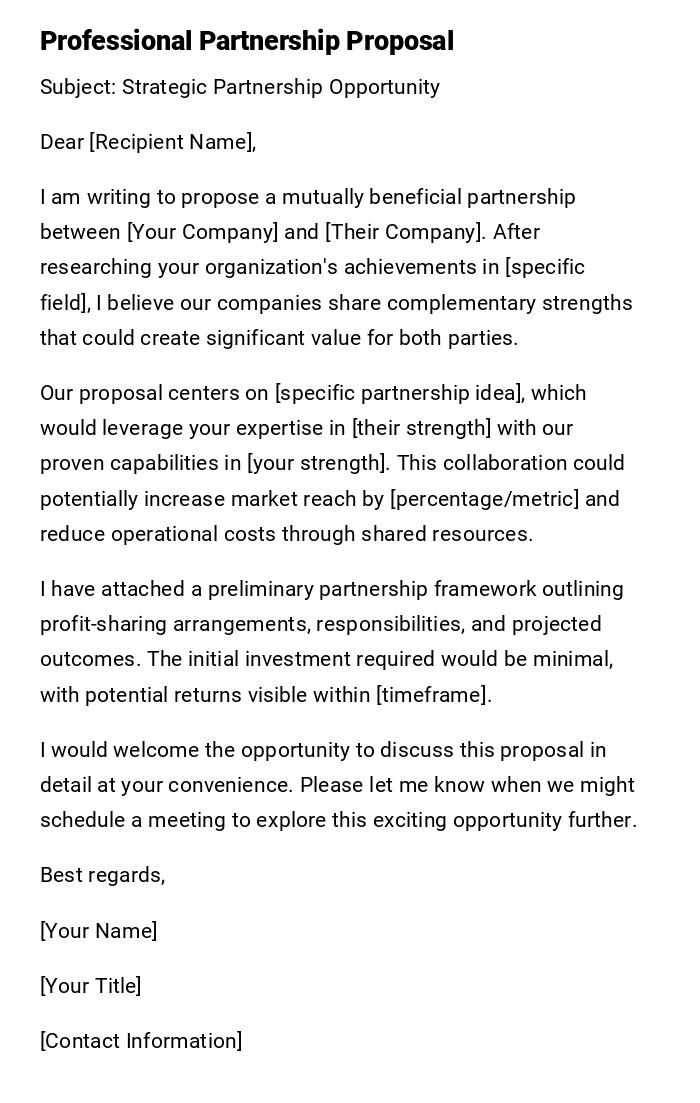
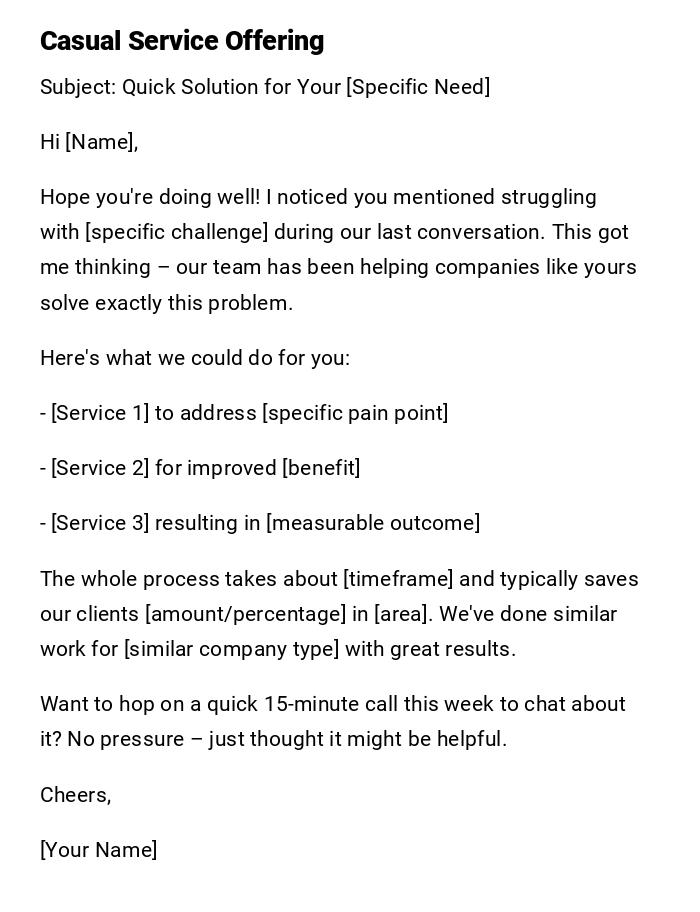
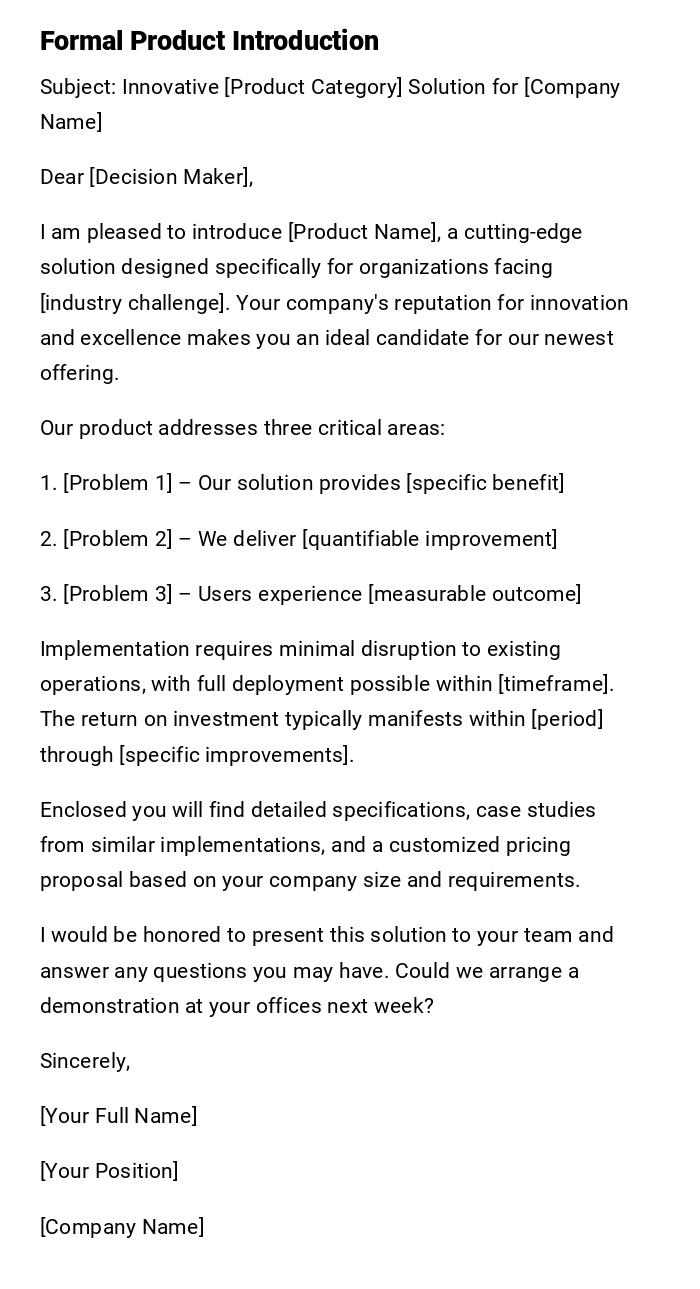
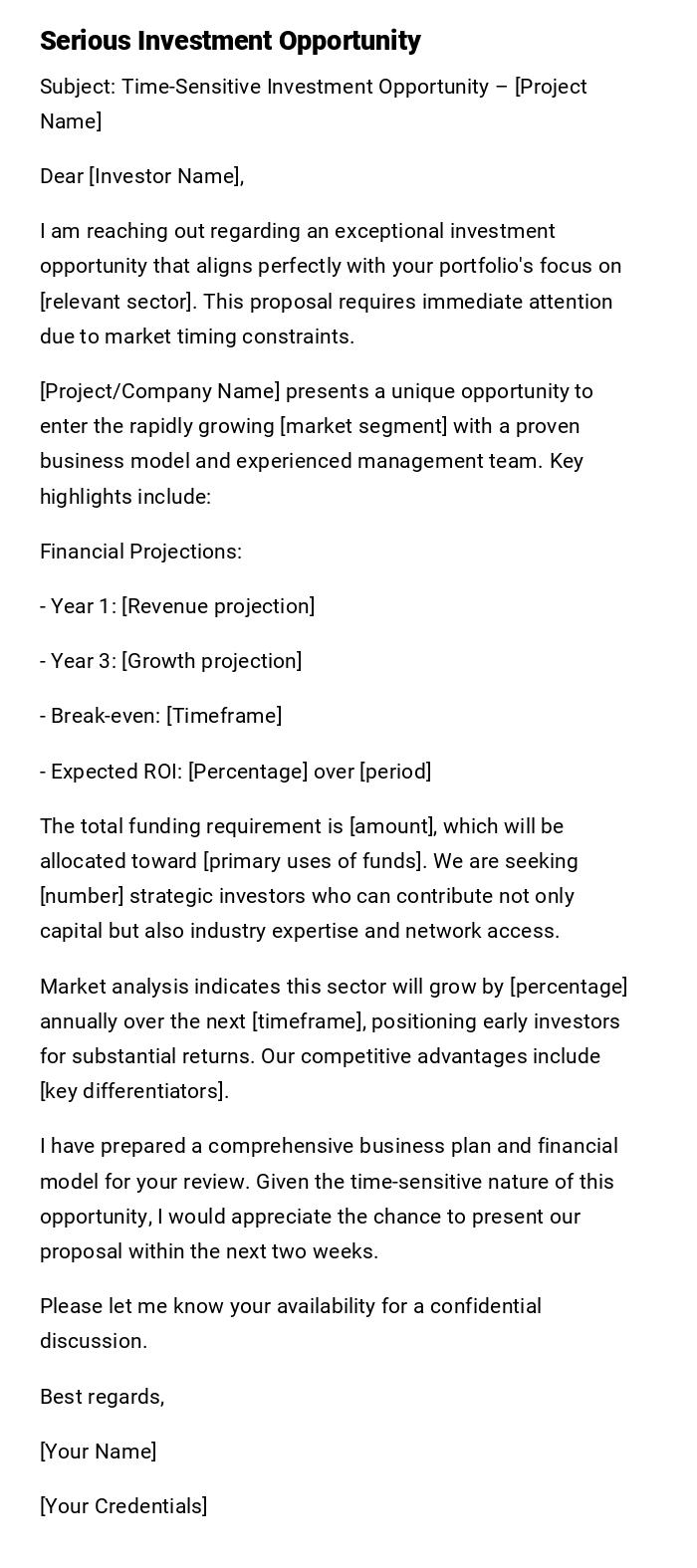
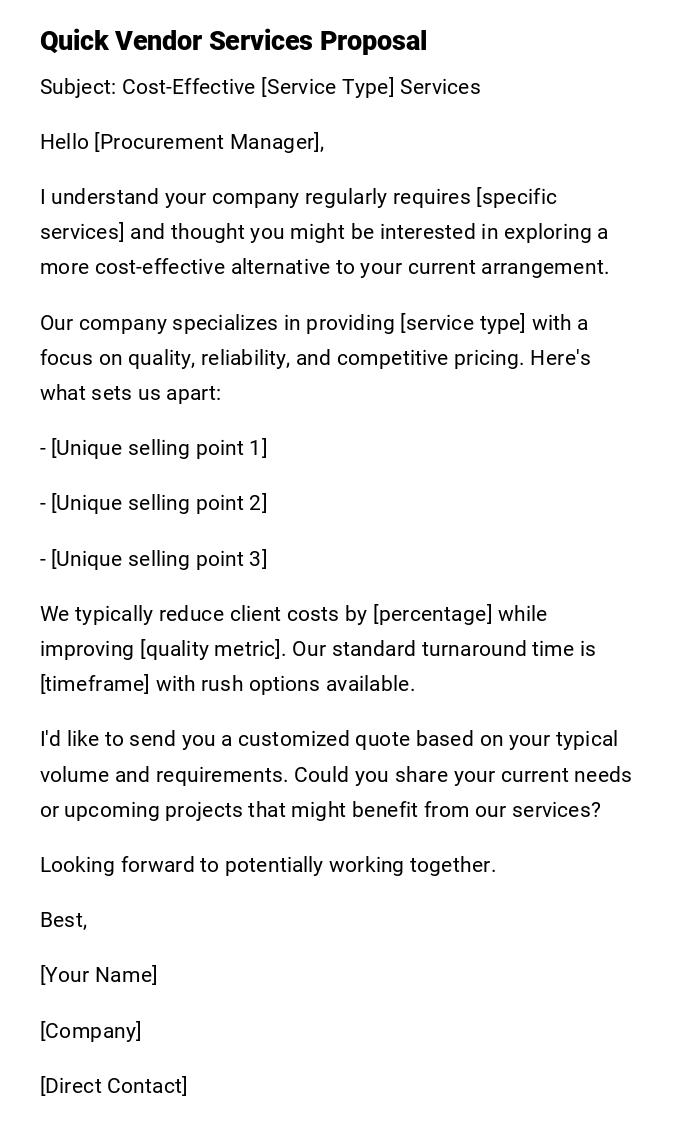
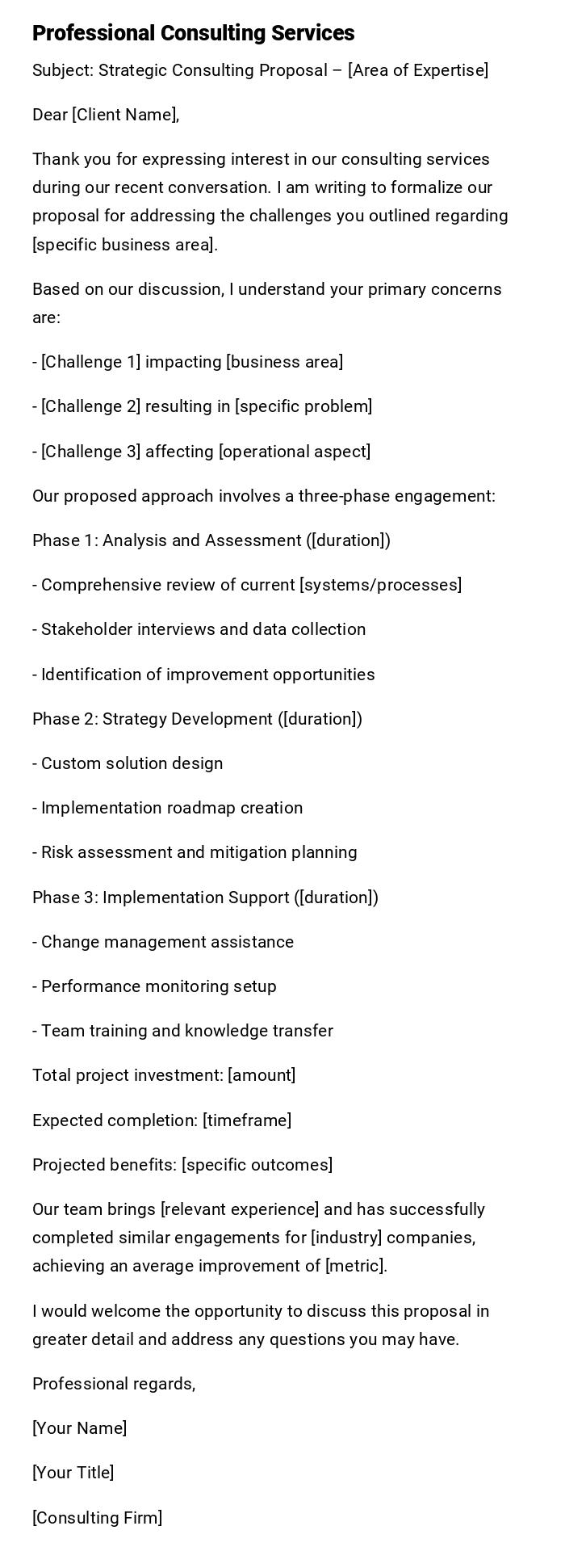
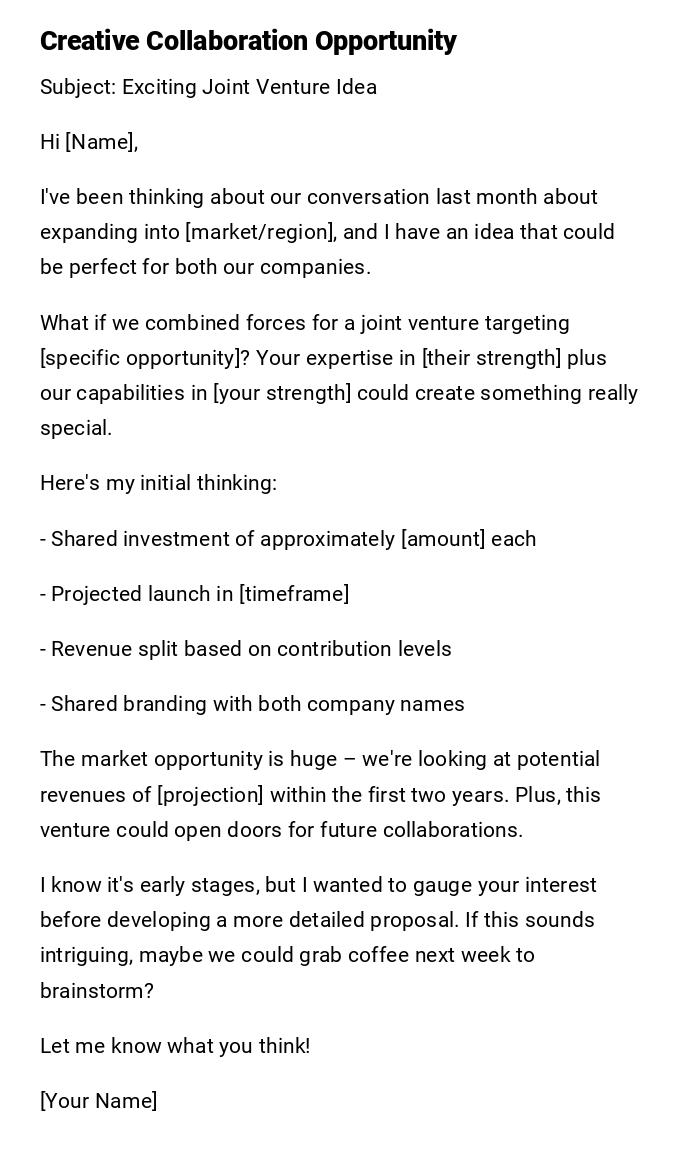

 Download Word Doc
Download Word Doc
 Download PDF
Download PDF